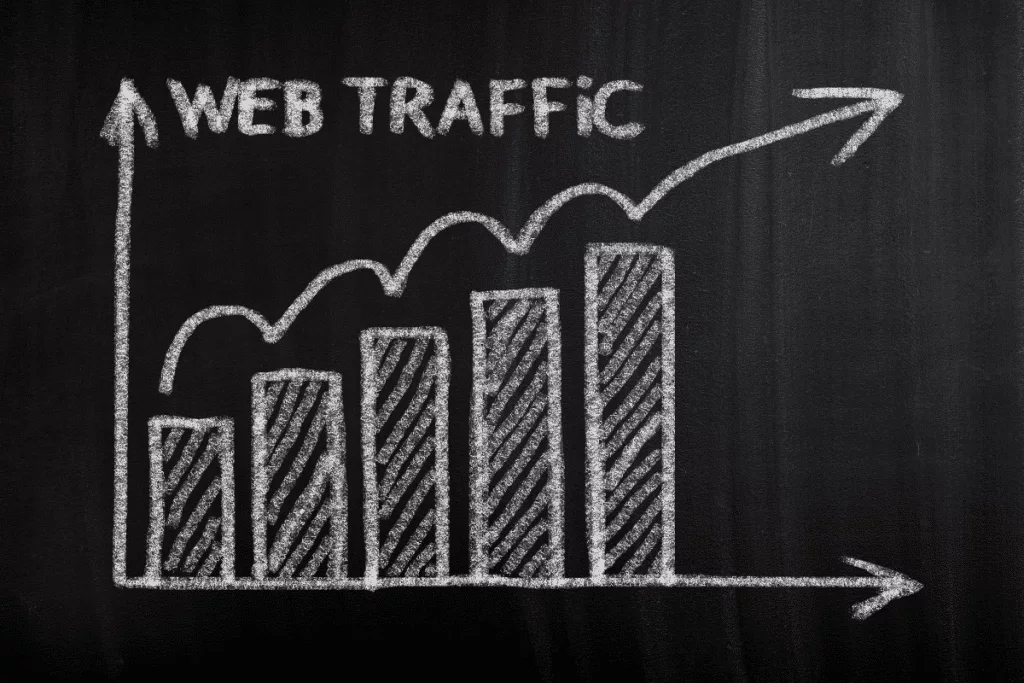Content marketing has seen a dramatic upsurge over the past decade and continues to evolve rapidly due to significant shifts in consumer behaviors. The digital marketers’ world is living by the mantra “Content is King,” confirming it as an indispensable catalyst for driving high website traffic.
This blog unravels the intricate relationship between high web traffic and the role of content marketing for digital marketers.
Understanding The Basics Of High Web Traffic
To appreciate the importance of content marketing, let’s first unravel the meaning of high web traffic. Web traffic refers to visitors landing on your website, including their engagement, such as clicks and browsing time. Increased web traffic implies that a considerable volume of people is interacting with your site’s content, attracted by digital marketing strategies.
At its core, web traffic represents the volume of users who visit a website and their engagements, including clicks and dwell time. High web traffic refers to more significant numbers of individuals engaging with your site’s content, thanks to the effective implementation of digital marketing strategies.
Several components influence high web traffic. Sure, content marketing plays a lead role, but let’s remember other factors: SEO optimization, robust social media presence, website design, user-friendly navigation, and regular content updates to cater to the ever-evolving needs of your audience. By understanding these elements intimately, a content marketing manager can develop relevant marketing strategies, streamlining content creation to resonate with readers better.
The Benefits Of High Web Traffic
Why chase high web traffic? A few reasons:
- Brand visibility: With high traffic, your brand garners increased recognition and industry authority. More website visitors translate into more opportunities to convert these users into customers or subscribers, ramping up lead generation.
- Data-driven decision-making: High web traffic equates to a larger pool of user data. Your marketing team can leverage this data to shape future marketing campaigns, create content that resonates with users, and foster long-term customer relationships.
- Website monetization: By attracting more visitors, your website’s monetization prospects are greatly enhanced. This includes securing ad revenue, sponsored content, or affiliate commissions, thus fostering overall company revenue.
In summary, high web traffic is not a vanity metric. Instead, it’s a catalyst in digital marketing, enhancing brand visibility, nurturing customer relationships, and opening the gates for various revenue streams. Mastering these tools and strategies becomes paramount as we explore the nexus between web traffic and content marketing. Stay tuned as we chronicle how content marketing is pivotal in sparking this change.

The Role Of Content Marketing In Digital Media
As the name suggests, content marketing involves creating, distributing, and promoting valuable content to attract and engage a defined audience. The ultimate goal? Drive profitable customer actions. This is the mantle that a content marketing manager often carries in their job description, balancing content creation with data analysis to refine a brand’s overall content strategy.
Content marketing is pivotal, acting as an axis on which the digital marketing wheel rotates. It helps brands convey their identity, story, and values through various forms of content, connecting with audiences emotionally. This emotional bond tends to foster loyalty, turning customers into brand ambassadors.
Content marketing’s role extends beyond mere creation – it involves analyzing how the content performs tracking user engagement to reshape marketing strategies as necessary. This feedback loop, where data informs the approach, makes the content marketing role invaluable in digital marketing.
The Relevant Types Of Content In Marketing
With many content types, content marketing managers must identify which styles align with their brand’s voice and audience preferences. Here are a few classes that have proven effective over time:
- Blogs: Easy to produce and consume, allowing you to update your site with new information frequently.
- Videos: More immersive than text, helping brands tell compelling stories.
- Infographics: Combines visual elements with short, clear explanations, perfect for illustrating complex concepts or statistics.
- Email newsletters: Maintain regular contact with customers while providing a platform for promoting new content or offers.
- Social media content: Engage directly with your audience and cultivate a community around your brand.
- EBooks and whitepapers: Long-form, detailed content that offers in-depth knowledge on a topic. They are often used as “gated content” that users can access in exchange for their contact information.
A content marketing manager’s job description often includes orchestrating a content team, including content creators, content editors, and social media marketers.
Content marketing’s role extends across a firm’s marketing department. By understanding content’s critical role in helping brands connect with their target audience, we can better appreciate the relationship between high web traffic and successful content marketing strategies.
Connection Between High Web Traffic and Content Marketing
Content marketing roles are a powerful magnet for web traffic. By consistently creating and sharing engaging, valuable content, digital marketers provide a platform designed to attract a targeted audience, thus fostering online visibility. A content marketing manager’s thoughtful planning and strategic content management boosts website visibility, lures web traffic, and ensures a firm’s voice and vision resonate across various digital platforms.
Content can take various forms – blog posts, infographics, social media updates, email marketing campaigns– all pathways directing users back to the website. These initiatives, skillfully orchestrated by a content marketer, are traffic high-ways designed to convert casual browsers into engaged visitors and, ultimately, faithful customers.
Merely driving high web traffic isn’t the ultimate goal – attracting the right traffic matters. Digital marketing focuses on quality over quantity, and content marketing shines here. With intentional content strategy and creation, marketers ensure the audiences they attract are those most likely interested in the products or services offered.
For instance, an email marketing campaign aimed at existing customers can navigate interested users directly to a new product page. These individuals have shown interest before – the audience a marketing team wants to engage. The same principle holds when creating SEO-optimized blog posts that answer specific queries of the target audience.
Strategies For Driving High Web Traffic through Content Marketing
A vital part of SEO is improving content visibility by making it more discoverable. By choosing high-performing keywords and incorporating them into the content, content managers enhance the site’s organic search ranking – driving more traffic.
Social media marketing and the creation of engaging content are inseparable. Implementing social media marketing entails repurposing the range to suit different platforms. Distribution through social media channels like Facebook, Instagram, or LinkedIn can put your content in front of vast audiences – exponentially increasing web traffic.
Email marketing allows digital marketers to share content directly with interested subscribers, driving even more traffic to the site. Developing high-quality email campaign content ensures subscribers stay engaged and eager to interact with your brand.
These three key strategies form the foundation for a robust content marketing role – driving high-quality web traffic and perfectly embodying the content marketer’s job.

The Consequences Of Neglecting Content Marketing
Disregarding content marketing can lead to a significant decrease in web traffic rates. Good content draws people to your site. Without it, search rankings fall, and virtual visibility dwindles, leading to reduced website traffic.
Online presence is intrinsically linked with content creation. More active content management is needed to maintain brand reputation and online presence. Potential customers form their first impressions based on online content; thus, high-quality content is necessary for the brand image to thrive.
Finally, the content marketing role is a significant driver of conversions and sales. The lack of a well-crafted content strategy can lead to missed opportunities. Content allows potential customers to engage with the brand and move down the sales funnel. With engaging content, you can avoid losing potential customers, ultimately hurting your bottom line.
Content marketing is fundamental to digital marketing; neglecting it can have severe repercussions. So, marketing managers should prioritize fostering a solid marketing team capable of delivering strategic content marketing campaigns that attract, engage, and convert.
Content marketing is the fuel that powers the digital marketing engine. Any lapse in content creation, strategy, or management comes with decreased web traffic as a cost. Content marketing managers and their teams must stay ahead of emerging trends, tailoring strategies targeting audiences in the right places and times.
Hence, a focused and progressive approach to content marketing role is the backbone of achieving and maintaining high web traffic. Investing in robust content marketing campaigns alongside email marketing strategies and other digital initiatives can ensure your brand not only garners web traffic but transforms it into real customer engagement.


